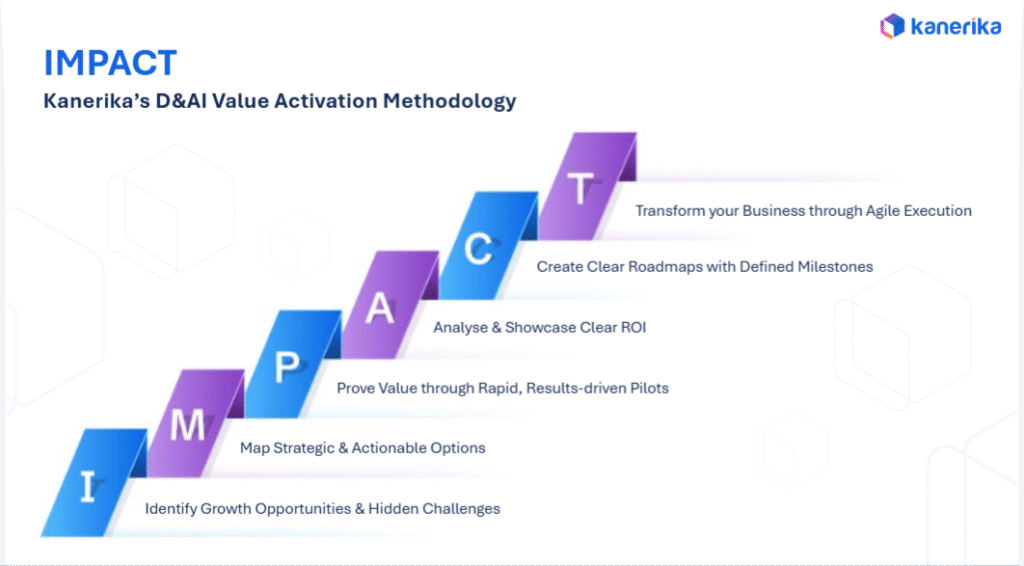In 2025, the business landscape is no longer defined by size, speed, or even technology—it’s defined by how well you use your data. Companies aren’t struggling because they lack data. They’re struggling because they lack a strategy. That’s why Data Strategy Consulting has emerged as one of the most vital levers for sustainable growth.
Today’s enterprises generate petabytes of information from customer touchpoints, operations, and digital platforms. But without a structured plan, that data quickly becomes digital clutter—unusable, untrusted, and disconnected from business goals. Consulting experts step in to change that. They align your data assets with your business vision, creating the governance, quality, and architecture needed to transform insight into action.
Consider how Starbucks rebuilt its customer intelligence systems to personalize experiences across most of it’s stores. Or how Maersk, the global logistics leader, partnered with data consultants to create a unified data layer that now powers predictive fleet routing and real-time port operations.
In 2025, data is no longer a byproduct—it’s your competitive edge. But only if you know how to use it.
Partner with Kanerika to Modernize Your Enterprise Operations with High-Impact Data & AI Solutions
What Is Data Strategy Consulting?
Data strategy consulting involves working with organizations to develop comprehensive plans for leveraging data as a strategic asset. Consultants help businesses transform raw data into actionable insights that drive decision-making, operational efficiency, and competitive advantage. The scope encompasses everything from data architecture design and governance frameworks to analytics implementation and organizational change management.
Key Objectives
1. Alignment
- Ensures data initiatives support overall business strategy and objectives
- Bridges the gap between technical capabilities and business requirements
- Establishes clear connections between data investments and measurable outcomes
2. Governance
- Develops policies and procedures for data management, quality, and security
- Establishes roles, responsibilities, and accountability frameworks
- Creates compliance structures for regulatory requirements and industry standards
3. Monetization
- Identifies opportunities to generate revenue from data assets
- Develops strategies for data productization and external data sharing
- Creates frameworks for measuring and maximizing data’s business value
4. Analytics Readiness
- Prepares organizations for advanced analytics and AI implementations
- Establishes data infrastructure and architecture foundations
- Builds capabilities for self-service analytics and data democratization
What a Data Strategy Consultant Does?
Data strategy consultants serve as strategic advisors who assess current data capabilities, identify gaps, and design roadmaps for improvement. They facilitate stakeholder alignment, recommend technology solutions, and guide organizational transformation. Their role involves translating complex technical concepts into business language while ensuring proposed solutions are practical and achievable.
Typical Engagement Models
1. Assessments
- Comprehensive evaluation of current data maturity and capabilities
- Gap analysis comparing current state to desired future state
- Identification of quick wins and long-term strategic opportunities
2. Workshops
- Collaborative sessions to define data vision and strategy
- Stakeholder alignment meetings to build consensus and buy-in
- Training sessions to build internal data literacy and capabilities
3. Roadmap Planning
- Development of detailed implementation plans with timelines and milestones
- Prioritization of initiatives based on business impact and resource constraints
- Creation of governance structures and success metrics for ongoing measurement
Why Businesses Need Data Strategy Consulting?
1. The Data Overwhelm Problem
Companies collect huge amounts of data from websites, sales systems, customer interactions, and operations but don’t know which information is actually useful. Teams waste time building reports and dashboards that look impressive but don’t help anyone make better decisions.
Without a clear starting point, organizations jump between different data projects without completing any of them effectively
2. Connecting Data to Real Results
Most data initiatives fail because they focus on collecting and organizing information rather than solving specific business problems. Companies struggle to prove their data investments are actually improving revenue, reducing costs, or enhancing customer satisfaction.
Leadership often questions why expensive analytics tools and data teams aren’t delivering measurable improvements
3. Governance and Tool Management Issues
Organizations face growing pressure to comply with privacy laws and data regulations without clear processes in place. Companies end up with dozens of different software tools that don’t communicate with each other, creating information silos.
Data quality problems persist because no one owns the responsibility for keeping information accurate and up to date
Success Story: Retail Turnaround
- A clothing retailer spent two years building a comprehensive reporting system that generated over 200 different reports monthly
- Store managers ignored most reports because they were too complex and didn’t address their daily challenges
- A data consultant identified the real needs: simple inventory alerts and customer buying pattern insights
- Within six months, sales improved 15% because managers finally had actionable information they could use immediately
Transform Your Business with Data!
Partner with Kanerika for Expert Data Consulting Services
Key Components of Data Strategy
1. Data Governance
Assign specific people to own and maintain different types of information across departments. Create clear rules for how information gets collected, stored, and shared between teams. Furthermore, establish processes for resolving conflicts when different groups need the same information for different purposes. 2Define approval workflows for new projects and system changes
2. Architecture & Infrastructure
Choose the right technology foundation: cloud services, on-site servers, or a combination of both. Build systems that can grow with the business and handle increasing amounts of information. Additionally, ensure different applications and databases can communicate with each other effectively. Plan for future needs while working with existing technology investments
3. Information Quality & Integration
Clean up messy, incomplete, or duplicate records that create confusion. Standardize how information looks and works across different systems and departments. Moreover, create reliable connections between sales systems, customer databases, financial tools, and other business applications. Establish ongoing monitoring to catch and fix problems before they impact decisions
4. Reporting & Business Intelligence
Build dashboards and reports that help people do their jobs better. Give employees tools they can use themselves without always needing IT support. Similarly, match reporting capabilities to what different roles really need – simple summaries for some, detailed analysis for others. Provide training so people know how to interpret and act on the information they see
5. Security & Compliance
Control who can see sensitive customer, financial, or competitive information. Meet legal requirements for information protection in your industry and geographic markets. In addition, monitor how information gets used and create audit trails for regulatory inspections. Balance security measures with practical access needs for daily business operations
6. Culture & Change Management
Train employees to use information when making decisions rather than relying only on intuition. Celebrate wins when insights lead to better business results. Meanwhile, address resistance to new tools and processes through gradual implementation and support. Build confidence in information accuracy so people trust and use what’s provided

What Does a Data Strategy Consulting Engagement Look Like?
1. Initial Assessment and Stakeholder Interviews
The engagement begins with comprehensive discovery sessions involving key stakeholders across business units, IT, and executive leadership. Consultants conduct structured interviews to understand business objectives, pain points, and current data usage patterns.
They assess existing data sources, infrastructure, and organizational capabilities while identifying critical success factors and constraints. This phase establishes baseline understanding and builds stakeholder alignment around strategic priorities.
2. Data Maturity Evaluation and Gap Analysis
Consultants evaluate the organization’s current data maturity across multiple dimensions including governance, technology, processes, and analytics capabilities. They benchmark performance against industry standards and best practices, identifying specific gaps between current state and desired outcomes.
This assessment covers data quality, accessibility, security, compliance, and organizational readiness for advanced analytics initiatives.
3. Strategy Roadmap Development
Based on assessment findings, consultants develop comprehensive roadmaps with both short-term quick wins and long-term strategic initiatives. The roadmap prioritizes projects by business impact, resource requirements, and implementation complexity.
It includes detailed timelines, resource allocation plans, success metrics, and risk mitigation strategies. The strategy aligns data investments with business goals while ensuring sustainable, scalable growth.
4. Tool and Technology Recommendations
Consultants provide vendor-neutral technology recommendations tailored to organizational needs, budget constraints, and technical capabilities. They evaluate platforms for data integration, storage, analytics, and visualization while considering factors like scalability, ease of use, and integration requirements.
Recommendations include implementation approaches and total cost of ownership analysis.
5. Implementation Support or Handoff
Depending on engagement scope, consultants either provide ongoing implementation support or execute structured handoffs to internal teams.
This includes detailed documentation, training programs, governance frameworks, and change management strategies to ensure successful project execution and long-term sustainability of the data strategy.
Benefits of Data Strategy Consulting
Companies collect massive amounts of information but struggle to turn it into useful insights. Data strategy consulting helps bridge this gap by providing expert guidance that transforms business information into real competitive advantages.
1. Aligning Data Projects with Business Value
Consultants ensure every data project directly supports business goals. They help companies focus on initiatives that deliver clear returns rather than chasing the latest technology trends. This focused approach prevents wasted spending on tools that don’t solve actual business problems, ensuring data investments contribute to revenue growth and cost savings.
2. Faster Decision-Making and Improved Returns
Consultants set up organized systems for collecting and analyzing information that cut decision time dramatically. By creating clear reporting processes, companies can respond to market changes in hours instead of weeks. This speed delivers better financial returns as leaders get the insights they need when timing matters most.
3. Better Data Management and Risk Reduction
Strong management policies protect companies from legal issues, security problems, and poor data quality. Consultants create clear rules for who can access information and how it’s stored and used. This prevents expensive cleanup efforts later while building confidence in business decisions.
4. Simplified Technology and Cost Savings
Many companies have scattered systems with duplicate tools that don’t work together well. Consultants design unified setups that eliminate waste, reduce software costs, and improve performance. This simplification makes everything easier to maintain while creating better user experiences.
5. Better Teamwork and Data Skills
Success requires people to change alongside technological improvements. Consultants create training programs that help different departments work together better and understand data in the same way. This improved teamwork ensures important insights reach the right people who can act on them effectively.

How to Choose the Right Data Strategy Consulting Partner
1. Industry Expertise and Cross-Functional Knowledge
The ideal consulting partner should demonstrate:
- Deep understanding of your specific industry challenges and regulatory requirements
- Cross-functional expertise spanning data engineering, analytics, and business strategy
- Knowledge of industry-specific data sources, compliance standards, and competitive landscapes
- Experience working with organizations of similar size and complexity
2. Proven Frameworks and Methodologies
Look for consultants who offer:
- Structured, repeatable methodologies for data strategy development
- Established frameworks for data governance and quality management
- Clear project phases with defined deliverables and timelines
- Documented best practices from previous implementations
Partner with Kanerika to Modernize Your Enterprise Operations with High-Impact Data & AI Solutions
3. Tech-Agnostic vs Vendor-Tied Approaches
Consider the consultant’s technology philosophy:
- Tech-agnostic consultants evaluate solutions based on your specific needs, offering unbiased recommendations across multiple vendors
- Vendor-tied consultants may push specific platforms but could offer deeper expertise in those tools
- Assess whether their approach aligns with your preference for flexibility versus specialization
4. Track Record of Success
Evaluate their credibility through:
- Detailed case studies demonstrating measurable business outcomes
- Industry certifications and partnerships with leading technology vendors
- Client testimonials and references from similar organizations
- Awards or recognition within the data and analytics community
5. Cultural Fit with Your Internal Teams
Ensure alignment by assessing:
- Communication styles and collaborative approach
- Willingness to transfer knowledge and build internal capabilities
- Flexibility in working with your existing processes and organizational structure
- Commitment to long-term partnership rather than transactional engagement
Data Strategy Consulting for AI and Digital Transformation
1. Why Data Strategy is Foundational for AI Success
Successful AI, machine learning, and generative AI initiatives require:
- High-quality, well-governed data as the foundation for accurate model training
- model trainingIntegrated data pipelines that feed clean, consistent information to AI systems
- Scalable data infrastructure capable of handling increased computational demands
- Strategic alignment between data collection and AI business objectives
Without proper data strategy, AI projects face common pitfalls including biased models, poor performance, and failed implementations.
2. AI Readiness Assessments as Part of Consulting
Data strategy consultants conduct comprehensive evaluations covering:
- Current data maturity levels and infrastructure capabilities
- Data quality, completeness, and accessibility across the organization
- Technical readiness for AI workloads and model deployment
- Skills gaps and training requirements for AI adoption
- Governance frameworks needed to support responsible AI development
3. Strategic Use Cases and Applications
Consultants help organizations identify high-impact AI opportunities:
- Customer Segmentation: Leveraging behavioral and transactional data for personalized marketing strategies
- Predictive Maintenance: Using IoT sensor data to prevent equipment failures and optimize operations
- Fraud Detection: Analyzing transaction patterns and user behavior to identify suspicious activities in real-time
4. Ensuring Ethical, Governed AI Outcomes
Proper data foundation enables:
- Bias detection and mitigation through diverse, representative datasets
- Transparent AI decision-making with clear data lineage and audit trails
- Regulatory compliance with data privacy laws and AI ethics standards
- Continuous monitoring and improvement of AI model performance and fairness

Future Trends in Data Strategy Consulting
1. Rise of Data Mesh and Federated Governance
The traditional centralized data management approach is evolving toward:
- Decentralized data ownership across business domains
- Domain-specific teams managing their own data products
- Federated governance models that balance autonomy with organizational standards
- Self-service data infrastructure reducing bottlenecks and improving agility
2. Integration with AI Agents and Data Fabric Platforms
Next-generation consulting increasingly focuses on:
- Seamless integration between AI agents and unified data fabric architectures
- Automated data discovery, cataloging, and quality management
- Real-time data processing capabilities supporting intelligent automation
- Platform-agnostic solutions that connect disparate data sources
3. Consulting Partnerships Shifting to Co-Creation Models
Traditional consulting relationships are transforming into:
- Collaborative partnerships where consultants and clients jointly develop solutions
- Shared responsibility models for long-term data strategy success
- Embedded consultant teams working alongside internal staff
- Knowledge transfer programs building sustainable internal capabilities
4. Focus on Data Product Thinking and Reusable Assets
Modern data strategy emphasizes:
- Treating data as products with defined consumers, quality metrics, and lifecycle management
- Building reusable data assets that serve multiple business functions
- Product management principles applied to data governance and delivery
- Monetization strategies for both internal and external data products
Unlock Strategic Growth with Kanerika’s Expert Strategic Consulting Services
Kanerika is a leading data and AI consulting firm, helping organizations harness the full potential of their data through tailored data strategy consulting services. As a certified Microsoft Data and AI Solutions Partner, we specialize in designing scalable data strategies that align with your business goals and industry demands.
Our consulting approach goes beyond tools and technology—we focus on building a strong data foundation through governance, integration, quality, and analytics readiness. By leveraging Microsoft Fabric, Power BI, and other modern platforms, we guide businesses through every step of their data transformation journey.
To ensure real business value, we follow our proprietary IMPACT framework, a D&AI Value Activation Methodology that helps clients:
- Identify growth opportunities and hidden challenges,
- Map strategic and actionable options,
- Prove value through rapid, results-driven pilots,
- Analyze and showcase clear ROI,
- Create clear roadmaps with defined milestones, and
- Transform the business through agile execution.

Whether you’re looking to modernize legacy systems, unify siloed data, or enable AI-driven decision-making, Kanerika’s expert consultants provide actionable roadmaps and hands-on support to help you succeed.
Partner with Kanerika to develop a future-proof data strategy that drives smarter decisions, regulatory compliance, and long-term business value.
Transform Your Business with AI-Powered Solutions!
Partner with Kanerika for Expert AI implementation Services
FAQs
1. What is data strategy consulting?
Data strategy consulting involves working with experts to develop a structured plan for how your organization collects, manages, analyzes, and uses data. It ensures that data supports business goals and is governed, accessible, and trustworthy.
2. Why do companies need a data strategy?
Without a clear data strategy, businesses often face siloed systems, inconsistent reporting, and low ROI on data investments. A strategy ensures alignment between data initiatives and business priorities, driving efficiency, innovation, and compliance.
3. What does a data strategy consultant actually do?
A data strategy consultant assesses your current data landscape, identifies gaps, defines goals, recommends tools and frameworks, and develops a roadmap to implement scalable, governed, and business-aligned data solutions.
4. How long does a typical consulting engagement take?
Depending on complexity, engagements can range from a few weeks (for assessments) to several months (for full strategy design and implementation support). The timeline is tailored to your organization’s size and needs.
5. What are the key components of a strong data strategy?
A well-rounded data strategy includes governance, architecture, integration, data quality, security, analytics enablement, and organizational change management.
6. Is data strategy consulting only for large enterprises?
No. Startups and mid-size companies can benefit significantly, especially when scaling operations, launching digital initiatives, or preparing for AI and analytics adoption.
7. How do I choose the right consulting partner?
Look for a firm with proven industry experience, cross-functional knowledge, tech-agnostic advice, strong case studies, and a collaborative approach that fits your culture.










